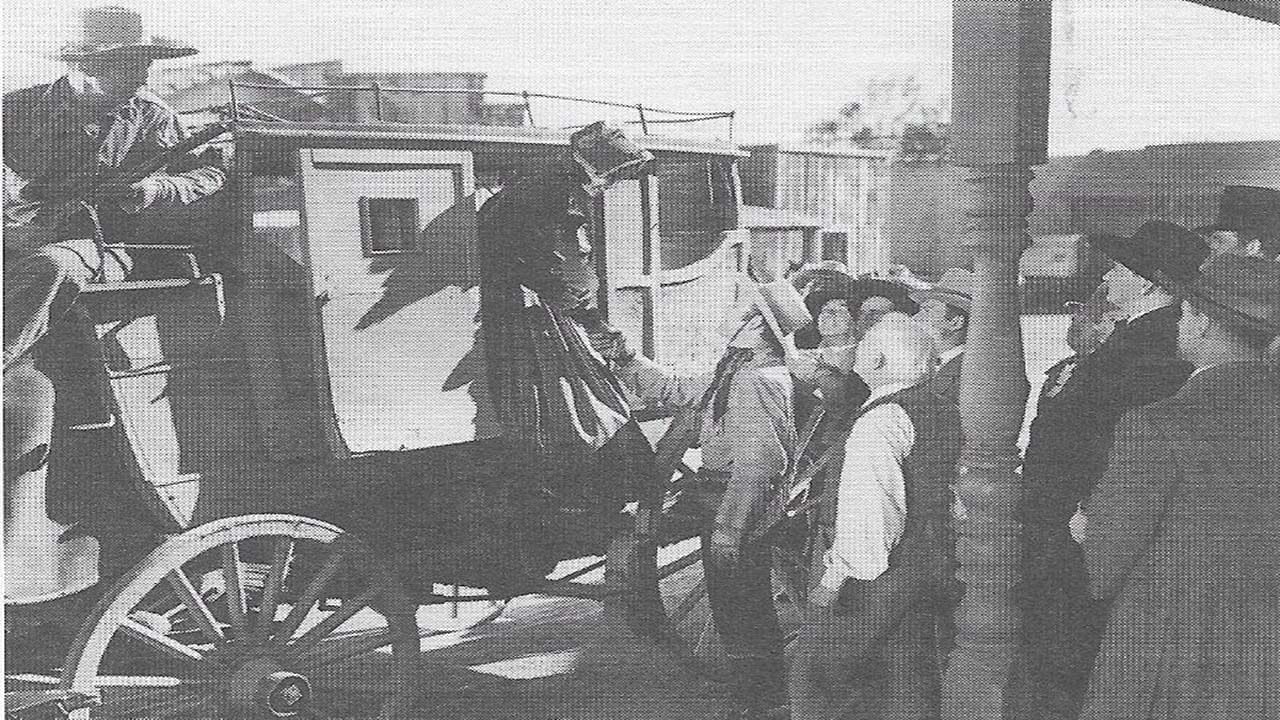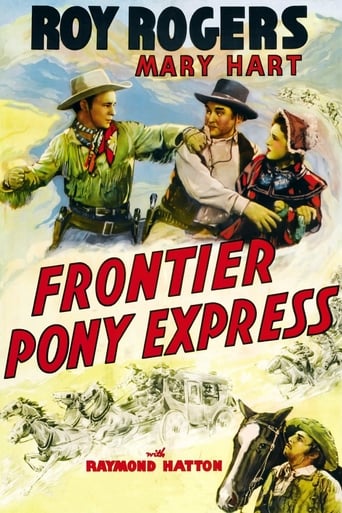Matrixston
Wow! Such a good movie.
SteinMo
What a freaking movie. So many twists and turns. Absolutely intense from start to finish.
Benas Mcloughlin
Worth seeing just to witness how winsome it is.
Staci Frederick
Blistering performances.
bkoganbing
Frontier Pony Express finds Roy Rogers cast as the best rider that the Russell,Majors&Waddell firm employs for their new Pony Express. Though it only lasted barely a year the Pony Express has certainly become a legendary outfit. In real life they employed juveniles as they were light in the saddle and speed was essential, the same principle by which you hire jockeys. Buffalo Bill Cody worked for them when he was 13 years old.As we also know it was that critical year of 1860 that the Pony Express operated and some southern gentleman are interested in the dispatches for the military it carries. When Roy Rogers can't be bribed the southerners resort to violence even making a deal with a notorious outlaw band headed by Noble Johnson. In fact the head southerner, a former US Senator Edward Keane has an agenda all his own.Republic Pictures gave Roy two songs to sing the traditional Stephen Foster ballad My Old Kentucky Home and a song written for the film Rusty Spurs which Roy delivers in his warm style.Getting the sidekick role is Raymond Hatton who played rustic types all the way back to the early silent years. Roy's leading lady is Lynne Roberts who in those early days before he met Dale Evans was his most frequent co-star.Very traditional plot recycled thousands of times in these films and in more adult westerns. The front row kids liked this one I'm sure.
MartinHafer
A very, very familiar theme in B-westerns, and especially Roy Rogers films, is the idea of a hero being a secret agent whose job it is to ferret out spies and pro-Confederate (South) subversives living in Union (Northern) states during the Civil War. In most cases, the evil folks actually are megalomaniacs who have visions of great power and even riches--and often want to make themselves kings in new countries splintered off from these states! Now this is not to say all the films were pro-Union--there were probably just about as many where the hero was a Southerner working to steal Union gold or the like. Regardless, this is VERY familiar territory.Another very familiar theme, especially in Rogers films, is the Pony Express. I have always found this to be VERY curious, as this service only existed between 1860 and 1861! In other words, it was obsolete soon after it began and its importance, at least to most historians, is negligible. Simply put, the telegraph soon replaced the service and was a heck of a lot faster. So, seeing Rogers trying to insure that the Pony Express continue uninterrupted for the sake of the Union seems silly because it was unnecessary. This film manages to merge both overused themes into one film! Roy works for the Express and to St. Joseph to investigate these 'copperheads' (Southern agitators). The plan for these agents in Missouri to interrupt the flow of information to Cailfornia. And, he very soon finds them and does what all good B-movie heroes should do--beat them up or shoot them in the hand! Had the Union and Confederacy actually used these tactics, over 600,000 lives lost in this war could have been averted (though a generation of soldiers would have had to contend with debilitating injuries to their shooting hands)! Can Roy uncover the plot, get the girl (who has come to hate him) and stop the megalomaniac by the end of the film? Well, what do you think.Considering that the plot is VERY familiar as is his relationship with the lady, there really is nothing new here. The film is pleasant but very predictable--and nothing more.By the way, pay close attention to the words as Roy sings "Old Kentucky Home". Most people are only moderately familiar with the first verse--and are unaware how racist the song actually is. Here, you get to hear it all in all its original 'splendor'.
classicsoncall
"Frontier Pony Express" features an early starring role for cowboy Roy Rogers, one in which he acquits himself reasonably well. Set in 1861, Roy's a Pony Express rider and acknowledged as the best in the business, so it would be a major victory for Senator Lassiter Calhoun (Edward Keane) to convince Roy to cast aside his Union loyalties and work for the Confederacy. Calhoun's plans however go beyond that, he's attempting to establish California as a separate republic, one which he will lead as it's president. Rogers can't be bought, and the dramatic tension is established early on a number of fronts.Virtually all of Roy Rogers' films employ a sidekick, and this one follows the pattern. Ray Hatton portrays Horseshoe, a trapper whose running gag has to do with a brooch he acquires from Mrs. Murphy (Ethel Wales) for a valuable beaver fur made from jackrabbits! Horseshoe spends the length of the story trying to get it back as it trades hands among different folks in the story.Roy's romantic interest in the film is portrayed by Lynne Roberts, going by the name of Mary Hart. She played opposite Roy for a number of films in the late 1930's, to be followed by Pauline Moore, Jacqueline Wells and Sally Payne before Dale Evans became a staple following "The Cowboy and The Senorita" in 1944. Hart's character flip flops loyalties a few times before the story's over, but winds up getting together with Roy in the finale.Generally, Roy would get to do at least three or four songs in his later films. Here he does a couple, including the standard 'My Old Kentucky Home' and another tune titled 'Rusty Spurs'. I was curious as to the selection of the first song, since Roy was a Northern sympathizer in the film.Even more curious though was the role of Roy's horse Trigger in the film. It appeared that Trigger was a Pony Express horse that Roy used during the story and didn't personally belong to him. Nevertheless, Trigger had his own reputation of sorts among the Express riders, since he was often requested by name. A riderless Trigger winds up saving a pouch full of Union vouchers by diving off a cliff into a lake to escape a bad guy posse, thereby earning another gold star as 'The Smartest Horse in the Movies'.I'm sure there are loads of 'B' Westerns with the Pony Express as a focal point, though I've only come across a couple myself. For anyone interested, check out the 1936 film titled "Cavalcade of The West". It explores the beginnings of the Pony Express, and offers Hoot Gibson in a featured role.
Snow Leopard
This Roy Rogers feature has a pretty good story and a good dose of action. It has Roy working as a Pony Express rider during the Civil War, who must try to foil a series of plots against the mail service. There is quite a bit to the story for a B-feature, and while the characters all remain one-dimensional, the plot, while at times implausible, is good enough to keep your attention all the way through. It's one of Rogers's earlier starring roles, so there are only a couple of songs, with more of an emphasis on the action. It all makes for a fast-paced movie that works as light entertainment. Most fans of old Westerns should find this one worthwhile.


